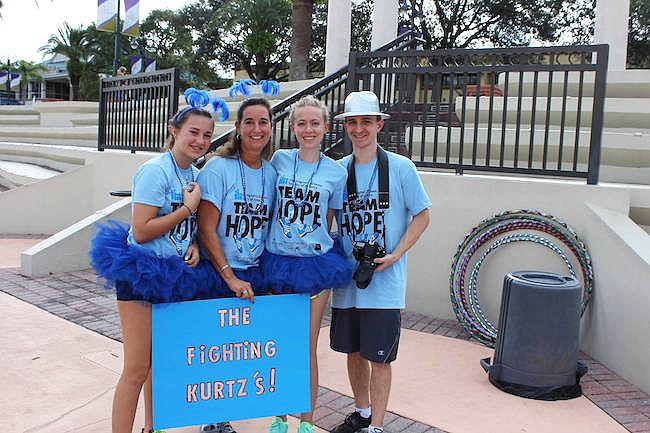- April 22, 2024
-
-
Loading

Loading

Central Florida resident Kari Gaston's father was a jokester, a businessman and a zealous pool player in his younger days.
But when she was a teen, her 6-foot-tall, brown-eyed dad went from running restaurants and hotels all around Central Florida to not being able to tie his shoes.
Gary Kirwan had Huntington's disease, a genetic, progressive neurological condition, and died from complications because of it, weighing a scant 150 pounds.
The disorder is characterized by involuntary movements, sporadic moods, emotional disorders, and trouble walking, swallowing and reasoning, according to the U.S. National Library of Medicine. Nearly 30,000 Americans suffer from the rare disease.
Kari Gaston cherishes memories of going to the movies or for pizza with her dad on the weekends — activities that wouldn't put his startling movements in the spotlight.
She remembers the first car he bought her: a red 1968 Pontiac Firebird he fixed up. Her mom was a little irked — she thought it was too fancy for an 18-year-old new driver. That was her dad’s bright personality shining through. And even as the disease ruled parts of his brain, he never lost his knack for telling a signature off-color joke.
But whenever he was the one in the driver's seat, Kari Gaston said police officers often pulled her dad over thinking he was a drunk driver. He'd had to explain time and again that it was just the disease causing his jerky moves. He eventually had his license taken away.
Kari Gaston’s older sister has the disease too. Her sister can't drive anymore, but despite her moodiness, slurred speech and movements, can still "light up a room,” Kari Gaston said.
Activism and positivity
For the last six years, Gaston's husband and three kids have devoted free time to fundraising efforts for the Huntington's Disease Society of America. Recently, the Gastons helped organize a bowling event that raised around $15,000, she said.
For the upcoming Team Hope Walk at Cranes Roost Park on Sept. 17, coordinator Leslie Fisk said the goal is to meet or surpass $20,000 — the amount raised from last year's walk. As of last week, the team had raised 22 percent of its goal.
Volunteering with HDSA is how Gaston met friend and Winter Park resident Karen Milek, who also has the disease. Milek’s mother, uncle and sister died due to complications. But despite the involuntary movements and off-balance gait, she leads an avidly healthy lifestyle, consistently running to train for her next marathon. Milek said she feels her purpose is to spread awareness of the disorder.
"We don't have our own ice-bucket challenge," Milek said. "Awareness is a much bigger problem."
Saying the word "Huntington's" doesn't ring a bell to most people, she said, the way hearing "Parkinson's" or "Alzheimer's" does.
Despite watching family members' health and self-sufficiency gradually deteriorate, and even losing some to the disease, the two friends seem to never lose sight of a silver lining.
"I'm very blessed — I have a beautiful family and beautiful kids and a great career," Kari Gaston said. A combination of gratefulness and spirituality colors her outlook on life and fuels her motivation to keep raising funds and awareness.
Milek said that although she wakes up every day knowing she has Huntington’s, battling a wacky balance and occasional falls, she strives to keep doing her best at work — she’s spent 29 years working at FedEx —and helps others who have it by leading support group meetings.
The bliss of not being tested
A child of a parent with the disease has an equal chance of inheriting the mutated copy of the gene or a healthy copy of the gene, explains the National Human Genome Research Institute. A person with the disease has inherited the mutated gene from one parent.
Kari Gaston’s stepchildren don't have Huntington's since her husband doesn't carry the gene, and her own child tested negative.
As for herself, she's made the decision of choosing not to be tested for whether she has the disease or not (for adult Huntington’s, symptoms typically develop between 30 and 50 years of age). So far, no symptoms have crept up — and although she and her husband have a plan in place for if they do, she'd like to bask in that bliss for the sake of her psyche and family.
When her older sister tested positive for the disease, she was in denial. She didn't want to believe that she was losing control of her body and mind.
"I am in a great state of mind and I don't want a diagnosis to possibly change it," she said.
"I wish it was more commonly known, and that people understood that it's a family disease and understand what the person is really going through," Kari Gaston said. She's working on becoming a certified support group leader.
Therapy can help, but Huntington’s doesn’t have a cure.
“Our goal is to have a fun, inspiring day where people are happy and hopeful, and we raise money and awareness for HDSA,” Fisk said, adding that most funds go toward research efforts.